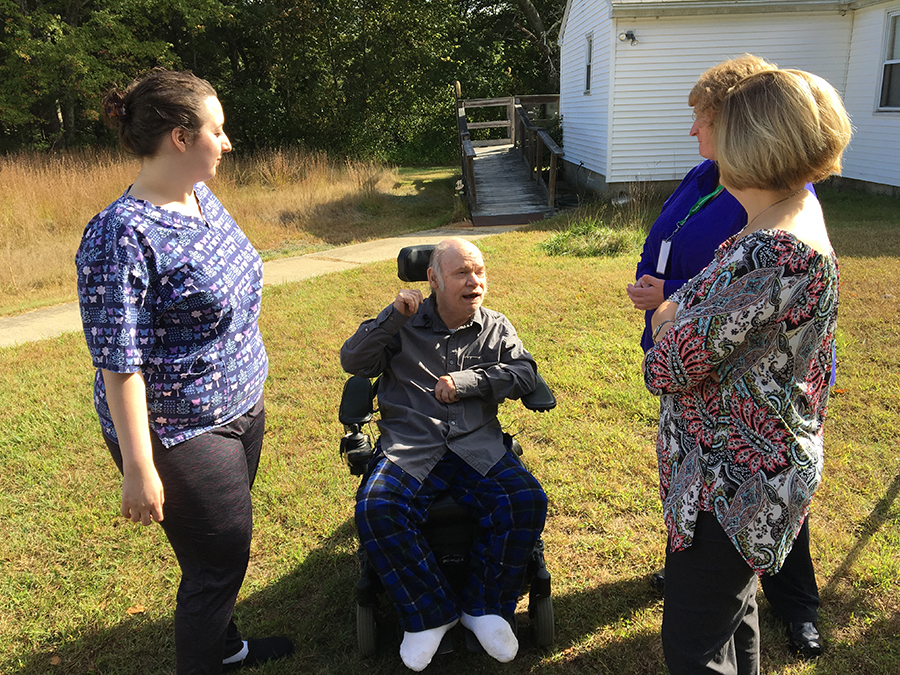It was a fluke accident in the middle of winter – and John barely survived.
“He came outside, and he got caught,” explains Darlene, from Bayada Home Health Care. “There was a snowbank and he was in his electric wheelchair. He got caught and the wheelchair tilted.”
John was stuck in the cold, just steps from his door but unable to get back inside. Icy water from the roof was dripping onto his legs. He spent close to 12 hours trapped outside. By the time someone spotted him, “he had frostbite [and had] had a heart attack. He was in really bad shape,” Darlene says.
“I don’t want to get stuck again like I did,” John recalls.
But that terrible night would end up improving John’s life in ways he never could have expected.
In addition to his Cerebral Palsy, John is also developmentally delayed. Since the deaths of his parents, he lives alone in the house he once shared with them. But after the snowbank accident, he ended up in a nursing home.
“I didn’t like it. I didn’t like it!” a fiercely independent John declares. “And I didn’t care for the food either.” John simply wanted to go back home.
John is one of nearly 1,500 Neighborhood members statewide who are managed with help from our community partner agencies. Most members in this situation were working with outside agencies before getting long-term support services status. To provide continuity of care, those members keep their relationships with those agencies, with Neighborhood’s supervision and assistance.
“In John’s case, the transition team from Neighborhood called and they said it was a really tough case,” Darlene explains. “[Neighborhood said], ‘We’ve worked with you before with these issues. Do you think you can give it a shot?’ So we said sure.”
In this case, Darlene from Bayada and Shena from Westbay Community Action team up, and bring in extra supports like Sophie, John’s CNA.
“It’s great that Neighborhood, West Bay, the home care agencies, the assisted-living facilities can partner together,” says Shena. “It makes our job a lot easier when we are able to collaborate and work together like this.”
Adds Darlene: “Because the family wasn’t involved, it was just as easy for everybody to put him in a nursing home and let them deal with it. But that’s not what he wanted. He wanted to come home to his home. This is all he’s ever known.”
 John’s life-threatening accident ended up connecting him to this incredible group of people who made that happen. But first, they needed to make sure John’s home was in the best possible condition to support him and his needs.
John’s life-threatening accident ended up connecting him to this incredible group of people who made that happen. But first, they needed to make sure John’s home was in the best possible condition to support him and his needs.
Initially, “the house was in a shambles,” Darlene recalls. “He had no electricity, no refrigerator, and no lifeline. No nothing. There were multiple [safety] issues in the home; his phone wasn’t working. So we had to get all that stuff installed.”
“Once we were able to get him some of those basic things,” says Shena, “he could feel like his own person again. He could go to the bank, he could go to the supermarket if we can get him there; he can go to doctor’s appointments.”
“Now, I’m good. I manage good,” beams John. “I can do it by myself. I can wash up by myself, and get into bed and things like that.”
Sophie, along with other CNAs, are still around every day to make sure John’s eating well and taking his medications.
“It’s just amazing to see somebody who was in the hospital, rehab, in a situation like John was — and now he’s pretty independent,” Shena says.
“It’s a good feeling, because even though it’s a lot of work to keep him here, that’s all he wants,” Darlene says. “He’s a very simple man. He just wants to be in his home. So to get him that wish makes us all happy.”